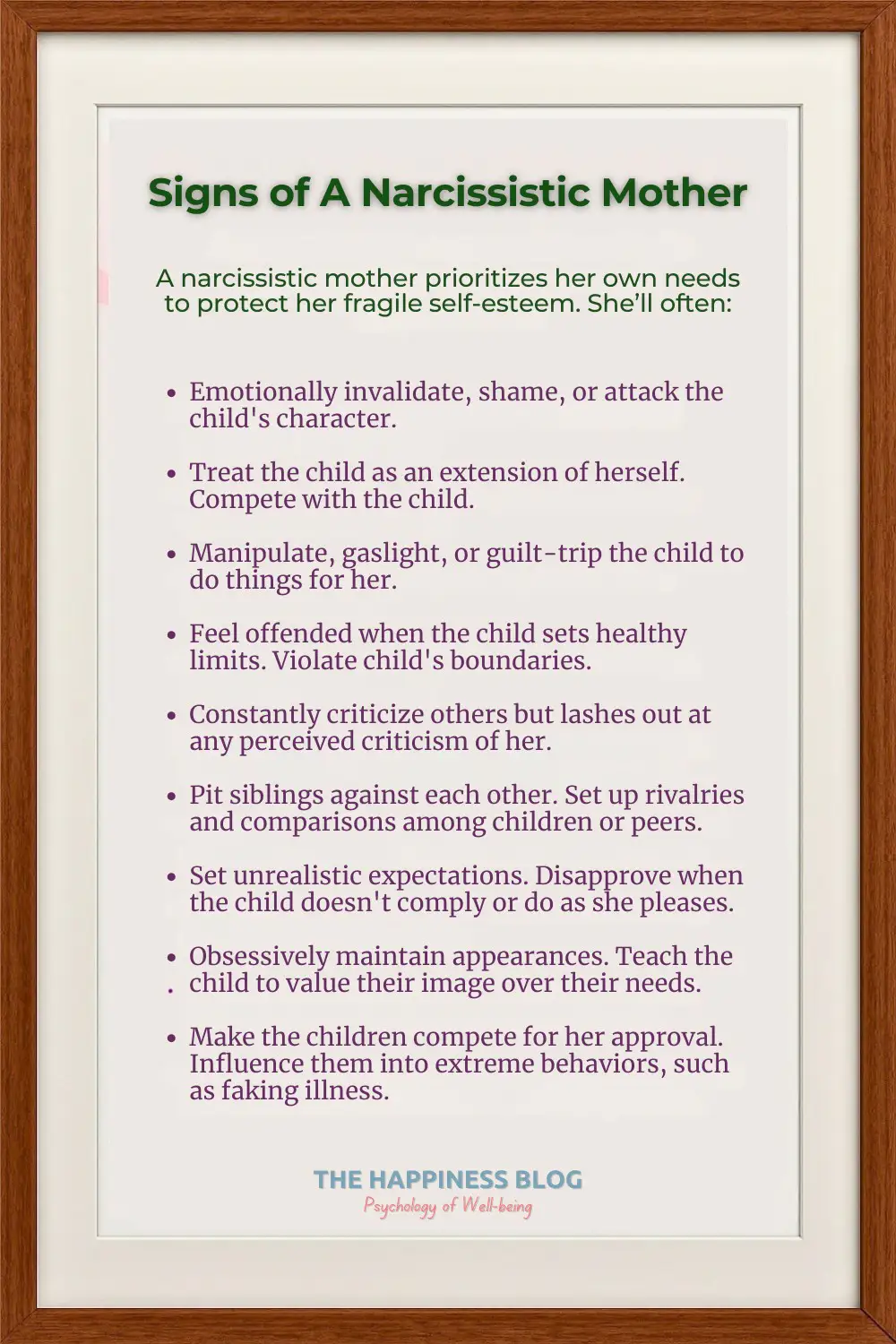Today's Saturday • 8 mins read
— By Dr. Sandip Roy.
Growing up with a narcissistic mother can mean having no boundaries, privacy, or personal desires. You learn not to have any secrets or exclusive needs.
When you assert yourself, she sees it as a disrespect of her authority. She reacts with rage if you try to tell her what behaviors of hers you won’t tolerate.
Many children raised this way believe that boundaries are selfish and cause conflict, so they avoid them in other close relationships as well.
If that sounds familiar, know this: You have the right to define where others end, and you begin.
Having boundaries with a narcissistic mother is a way to heal from dysfunctional conditioning, not to be cruel.
How To Set Boundaries With Your Narcissistic Mother
Boundaries define acceptable behavior or personal space in relationships. They declare where your own needs and safety zones start and where those of others end.
Every relationship must have these six boundaries.
Here are some ways to set boundaries with your narcissistic mother:
1. Understand the inner world of a narcissistic person.
Most narcissists share some typical traits, mainly an inflated sense of self-importance, a deep need for admiration, and a marked lack of empathy
Your narcissistic mother is likely to have those, and more. They make it hard for her to respect your need for autonomy or privacy.
She often dismisses your expressed feelings, condemns you for voicing needs, and even tarnishes your character for having desires.
She can use guilt‑tripping, gaslighting, blame‑shifting, and other manipulations to maintain control in the house. To preserve a flawless image, she refuses to accept responsibility for mistakes.
She compares you with siblings or peers to provoke rivalry and maintain control. And teaches you to keep up appearances even when you’re struggling.
A typical narcissistic mother will see you as an extension of herself, treating your achievements as her own reflections, rather than your growth.

Understanding her nature helps you recognize when she is showing narcissistic behaviors and respond in healthier, more appropriate ways.
2. Identify your own boundaries.
You can’t defend undefined limits. So, take time to define what your boundaries mean for you before setting them with your narcissistic mother.
Ask yourself what situations leave you anxious, guilty, or resentful. Those feelings often mark where your limits are being crossed.
Make a list of the behaviors you will no longer tolerate. For example, her constant criticism, guilt-tripping, verbal rants, breaking things, comparisons, imposing life goals, or any other emotional manipulation.
Writing boundaries down creates clarity. You’d remember what you told her, and find it easier to stay firm when she challenges you.
- One vital point: Boundaries are about you. They state what you will do if the other person crosses a line, not what the other person should or shouldn’t do.

3. Communicate your boundaries clearly.
Once you’ve decided on your limits, express them in simple, direct language.
Narcissists are known to twist words or exploit vague statements, so be precise with your narcissistic mother.
Speak calmly and without over-explaining. Say what behaviors you won’t accept and what you’ll do if they continue. For example: “I won’t stay on the call if you start criticizing me.”
It may feel uncomfortable at first, especially if you’re used to pleasing her. Do it anyway.
She might resist. Stay firm and make it clear that from now on, you define your own space. Tell her these are your boundaries to be respected, just as you’ll respect hers when she sets any.
You can even give her a copy of your boundaries in a message or email. That way, there’s no confusion later.
- One vital point: Boundaries don’t need permission. Avoid emotional debates or justifications; you’re stating a boundary, asking for approval.
4. Limit contact and say “no” more often.
You don’t owe her unlimited access to your time or attention.
Limiting contact with your narcissistic mother helps stop the drain on your energy and protect your peace.
Set clear boundaries for calls, visits, and conversations. Decide when and how long you’ll engage, and stick to it.
It’s perfectly okay to say “no” when something feels wrong or forces you to betray your comfort.
You have every right to make choices that prioritize your well-being. It’s also okay to say, “I’m leaving this conversation,” when her words create emotional chaos.
- One vital point: Boundaries are for self-preservation, not defiance or desertion. Every “no” you say to manipulation is a “yes” to your sanity, space, and self-respect.
5. Set limits on your support.
Decide and tell her clearly how much support you’re truly willing and able to give: financial, emotional, or practical.
You are not her therapist, rescuer, or emotional sponge. If she leans on you for constant reassurance or expects you to fix her problems, you are allowed to set time and topic limits.
For instance, tell her, “I can talk for fifteen minutes, but I can’t discuss that issue again today.” Or, “I’m not in a position to help financially.”
It may feel distressing or depressing, but protecting your energy isn’t selfish. You can responsibly care for her without carrying her. Boundaries around support are part of staying emotionally healthy.
- One vital point: Every time you rescue her from the consequences of her behavior, you reinforce the pattern that drains you. Real support includes knowing when to step back.

6. Don’t share everything with her.
To a narcissist, information is power. They can freely use it as a weapon against you.
So be selective about what you share, especially your plans, emotions, and intimate matters. Don’t tell her about your finances, your passwords, your relationships, or your therapy sessions.
Keep conversations neutral and surface-level, if needed. You don’t owe detailed personal updates or emotional disclosures to someone who uses them against you.
If she twists your words, criticizes your goals, or uses what you tell her to guilt-trip you, give her even less to work with.
The less she knows about your vulnerabilities, the less control she has over you.
- One vital point: Privacy is a boundary too. Protecting your personal life from misuse is emotional safety.
7. Seek support from others.
Dealing with a narcissistic mother can be emotionally exhausting, and you shouldn’t face it alone.
It’s a sad fact that narcissists try to isolate you from your support network, leaving you with no one but them to rely on for support.
Build a support system that understands what you’re going through. Friends, trusted relatives, or a therapist can help you process emotions and keep your boundaries tight when guilt creeps in.
Join an online or local support group for adult children of narcissists. Hearing others’ experiences can validate your own. You feel relieved that the problem wasn’t you, but their pattern of abuse.
Beware of getting into a relationship with another narcissist. It often happens because you tend to find safety in the familiarity of your mom’s narcissistic patterns.
- One vital point: Boundaries hold better when you’re supported. Honest people outside the toxic system remind you that your limits are valid and necessary.
8. Take care of yourself.
Setting boundaries isn’t just about managing your mother. Boundaries mark what you should, and should not, tolerate. They create the safe space you need to heal.
Prioritize habits that calm and center you: exercise, journaling, meditation, or time in nature. Replace guilt with self-compassion and small acts of self-respect each day.
If you’re struggling with anxiety, depression, or emotional flashbacks, seek professional help. Therapy can help you unlearn the guilt, obligation, and shame instilled by years of manipulation.
As you start to heal, you’ll notice how much you neglected your own care and needs for years.
- One vital point: Self-care keeps you mentally strong to maintain your boundaries. You won’t be able to maintain them for long if you ignore your rest, peace, and personal space.
Final Words
Healing doesn’t come from simply enduring abuse.
Setting boundaries with your narcissistic mother is an act of self-preservation. You’re protecting your emotional existence.
Boundaries allow you to freely do what your body and mind require: rest, nurturing care, and reassuring human connection.
√ Also Read: Why Do Narcissists Feel Sad: Is Narcissism A Form of Depression
√ Please share this with someone.
» You deserve happiness! Choosing therapy could be your best decision.
...
• Disclosure: Buying via our links earns us a small commission.